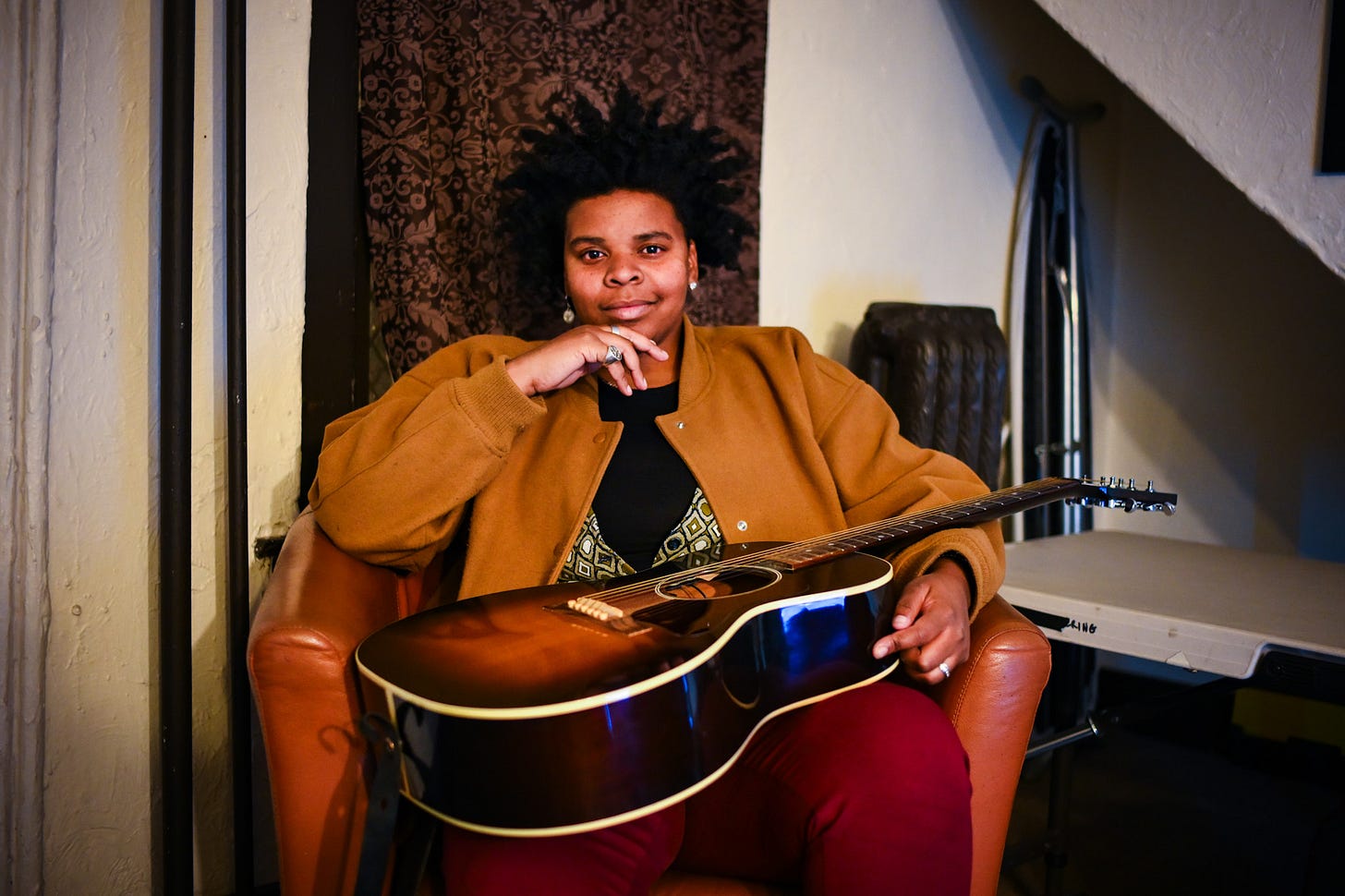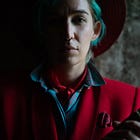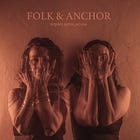CR 050: Singer-Songwriter Joy Clark is Charting Her Own Course
The celebrated musician discusses the release of her debut solo album and what she learned from performing with Brandi Carlile and Allison Russell.
Singer-songwriter Joy Clark was born into a tightly knit, deeply religious family in Southeast Louisiana. After graduating from the University of New Orleans, Clark spent many years touring with and supporting other artists, including Cyril Neville, Allison Russell, and Brandi Carlile, and performing on some of the most prestigious stages in the world. Now, she has finally, at age 40, stepped into the spotlight. Last fall, she released her debut album, Tell It to the Wind, on Ani DiFranco’s Righteous Babe Records. The album, which Clark refers to as a declaration of her independence, reflects her identity as a queer Black woman while also giving a nod to the music and traditions that shaped her.
Though some might think that waiting until 40 to release an album may seem like an unusual move for an accomplished musician, Clark says she has no regrets. “I’ve always wanted to release a project,” she says. “I just wanted to wait until I felt like it is the perfect time. That period between 2022 and 2024 was like, ‘I’ve met the person that I want to produce my album, and it just feels right. It’s time.’ I tell people I turned 40 in 2024, and people [say], ‘Wow. Why did you wait so long?’ Well, I actually think this was the perfect time to do it. There’s no big hand of the music business controlling anything for me. It’s really the people on the ground, the people that are right next to me, my experiences, and the things that I have to say to both encourage myself and encourage people that choose to hear what I have to say.”
Over Zoom, Clark chatted with me about her upbringing; working with one of her musical heroes, Margaret Becker; and the influence of New Orleans on her creative process.
SANDRA EBEJER: I want to begin by talking about your background. When did you start playing music?
JOY CLARK: Music was always playing in my head. I was just one of those creative kids. Before I even got a guitar to play, I would play on a tin can. Something about banging on a tin can made me think of an acoustic guitar. [Laughs] I was doing that at six years old. And my family went to church a whole bunch, so I was already singing in church. I feel like it was always around me. My dad sings, so I have these distinct memories of finding harmonization, which seemed magical, because it’s not something that someone teaches you, but it came naturally to me. I started playing guitar at about 12 years old, and I was just left to figure things out. I didn’t take any guitar lessons. It was mostly just listening to music and training my ear a lot. I realized I had a good ear, and I could just pick things up. Once I picked up the guitar, it took some work and trial and error, but it was something that I really wanted to do. So, I feel like I started playing music at 6, 7, 8, and then when I got a guitar, I started to figure out a lot of pop songs.
I read that you attended the University of New Orleans. New Orleans is a city unlike any other. How did your approach to making music change as a result of living there?
I grew up in a little town outside of the city of New Orleans proper. I grew up in Harvey and I was homeschooled there, and then when I went to college, I moved out of my parents’ house for a little bit. It was there at college that I took music theory. But probably at the tail end of my college career I played my first gig. I was playing some background music, and I played a whole bunch of covers. I played a lot of Bob Marley and a lot of Sade.
I feel like New Orleans is just one of those places where if you can play, there’s a place for you to play. It’s probably one of the best places to try your craft. I mean, I remember being in a Guitar Center, shopping for a guitar, and there was a bass player that heard me playing. He was like, “You can play! I’m playing tonight at such and such place. Come and sit in.” And I did. I had to wait a couple hours, but he called me up on stage. It’s a really generous place. If you’re trying to play live, if you’re trying to do anything, there’s a place for you to just sink or swim. [Laughs] And people are pretty nice [even] if you sink. It’s not that serious.
You’ve been a backup performer for many musicians and just last year at age 40 released your debut solo album. What was the catalyst for you stepping into the spotlight and putting out your own work?
It was a lot of things. That’s a great question. I smile when I think of it. I mean, I’ve always wanted to. I think being around artists and being inspired by people putting together a project, putting together a team, and bringing all the experiences from their life gave me the confidence to say, “Okay, I’m playing with Allison Russell. I played on her album, and I got to tour with her. I got to share the stage with Brandi Carlile.” Those things, being around people that make creating art a little less scary, gave me the confidence to see that you have a story, you have something to say, you have the community. This business doesn’t have to be cutthroat and scary. It’s really just about finding your community and finding people that want to hear what you have to say. It made it less of, “I’m doing this big, scary thing, and I have to get these people on board.” I mean, I’ve been performing with artists, and I’ve been finding my audience. I think all of those things paired just made it like, “I can do this. It’s time.”
You just mentioned that you’ve played with Allison Russell and Brandi Carlile. Is there anything that you’ve learned from the artists you’ve worked with over the years that has really stuck with you as you’ve embarked on your solo career?
Ooh. That’s a great question. I think it starts with the story. I think those artists are masters at putting their story to the forefront. And also, I’m going to go back to the community aspect of it. They’re particularly great at shining the light on other artists. I’m thinking about people like Ani DiFranco. She’s so generous with her spotlight. I got to open for her in January for a couple months, and I was blown away at the great experience that I had. I’m not saying I didn’t know she was a great person, but there’s always the horror stories of, “Man, I was on the road with this person, and I opened for them for two weeks, and they treated me like shit.” Those artists don’t do that. It shouldn’t be such an amazing thing, but in the industry, I think it’s saying a lot [that] you really respect other artists, and you prop them up. It makes for a very humane experience. That’s what I’ve learned from them.
In the song “Guest,” you sing about “living like a guest” and “settling for less” in your life. As a gay woman, you must have had to shed much of what you were taught by the church that you were raised in. What role did writing songs play in helping you navigate that journey?
Yeah, I grew up playing music in church. My dad’s a pastor. He still is a pastor, and I found a lot of comfort in making music on the stage at church. That was my first stage. It meant that it was not all about me. You’re playing through people raising their hands and singing and praising. They’re not just looking at you. It’s not like, “Oh, it’s my stage, and everybody’s marveling at me.” But, once I came out, I was dismissed from playing music at church.
I think when you are not living your truth and when you’re not out in that type of environment, you become a master of keeping key facts out about yourself or not really leaning in as much as you could, because there’s just a stopping point. You’re never totally open. “Guest” came from a place of a lot of work and seeing, “I feel like I’m not totally living my life. I can’t be happy about these amazing things that are going on, these amazing accomplishments, because I’m so used to hiding myself and not totally going for it.” You know, I think it says a lot when you’ve played on a Grammy stage or you’ve played on a popular TV show, and then you get back in your room and it’s like, “Wait. What? Did I just do that? I can’t get too happy, because tomorrow something terrible might happen.” Those types of things. So “Guest” came from all of those little places. Like, I haven’t been taking as much as I can. I haven’t been enjoying my life as much as I could be. So let’s change that. Let’s just feel that feeling and put it into a great song with some beautiful music and a wonderful melody.
Margaret Becker produced the album and co-wrote many of the songs with you. How did that collaboration come about?
Margaret is a big part of my life. I talked about playing music in church. She was huge in the Christian world, a four-time Grammy nominated [artist]. And when I was playing music in church, a lot of the songs I would perform would be songs by her. When I was a preteen, I was learning a lot of her songs and then performing them in church.
I got to meet her through a mutual friend of ours and we hit it off. I was at Americana Fest in Nashville, and we had dinner and then we just started to talk, and I shared a song with her. Then we started writing the song together. And then we just kept having FaceTime meets. Sometimes we’d write, sometimes not. She’s one of those people that had a big presence in my musical life, and I always felt some type of connection. So it’s no mistake that we got to meet and then still had a connection and got to write these songs.
You know, I talk about shining the light on people that have had a big part in our lives, and she’s one of those people. You find out about this badass woman, singer, producer who had an effect on me and then we get to meet each other and have a connection and write these very purposeful songs—it was like kismet coming together to do this thing. It’s wonderful to have a teammate, a friendship, and a collaboration. That was one of those things that I could have never dreamt up. So, that’s how it came to be. I mean, it was that type of connection with someone who long ago made me feel seen in a way that I couldn’t really put to words. And then to meet her 30-some years later and choose to make a project together and write these songs, it gives me goosebumps. I think that’s what music is about, bringing people together, sharing your experiences.
It’s interesting that the album is so much about you coming into your own and being who you are today, but it’s still got this great tie to your childhood, including this musician that you were so influenced by. That’s really cool.
Yeah! It takes a minute to be able to realize that church life, as repressed as it was, is a part of my story. And this whole process has just been learning to embrace that and then turn it on its head and create it into something that is actually useful in my adult life. [Laughs]
Are you someone who plays or writes every day?
I wish I was. I could lie and say, “I wake up every morning with my guitar and I write something.” Sometimes I’m that person, and sometimes I’m the bird watcher, and I go on two-hour walks, and that’s my creative process for that day. I think it’s important to find different things that get the creative juices flowing. For me, sometimes I just want to sit and tinker on my guitar and practice some things or think, and sometimes it’s just walking.
What is the songwriting process like for you? Do you typically start with lyrics? Or are you more driven by the melody?
You know what, Sandy? It’s a bit mysterious. There’s a way that things normally come, which is, I pick up the guitar and I’m playing the thing that maybe I play all the time when I pick up a guitar, and I’m probably tired of it and I’m like, “I always play this stupid thing.” And then I realize, “Well, maybe the stupid thing is saying that this may be song territory.” That’s one way that a melody comes. Sometimes it’s diving into a feeling and diving into certain colors. There’s not one way to it. I always say it’s a practice, and then there’s a lot of mystery that has to show up and that’s where your melody is. A lot of the times I’ll be working on a melody, and I think it’s one thing, but when I actually go to sing it, the more natural way comes out. So it changes every time. I have to be flexible in how that song is going to come to life. I have to be open minded. It’s always a mystery.
Who or what are some of your influences? Who do you turn to when you’re seeking inspiration?
Stories. It can be stories from other people. I’ve always been a history buff. My grandma would tell me a lot of stories. She was born in the ‘30s. She grew up during the Great Depression and segregation. Sometimes I’ll pull off of her stories of strength and perseverance. That woman went through the Jim Crow South, and I don’t think we talk about it in this country enough, what that actually was. That was fascism. I mean, we’re talking about it now for a whole different reason, but we’ve gone through this before.
So I pull off of stories from other people. There are slave narratives that I’ve been diving into and the power from those is that it doesn’t come from these very powerful people. We learn about people like Frederick Douglass, and we learn about the big names. But I think everyday stories can be more [powerful] because we can see ourselves in that. You don’t have to be a person of a lot of stature to have something to say. So a lot of times when I’m feeling a little hopeless and I need inspiration, I turn something else on. I help other people. I turn the focus off of myself.
What advice would you give to aspiring songwriters?
If you’re an aspiring songwriter, jot silly things down, use your phone recorder. Write the small things, and then the small things become a theme and maybe you can make something from that. Not everything you write is going to be something that you actually create. And if you haven’t penned a song in a long time, don’t be discouraged. Just keep going. The main thing is don’t get discouraged. And if you do get discouraged, write about it. Don’t stop just because you don’t feel like you’re in a good space, because writing about the not good space gets things moving, and you might create and that’ll get you out of the funk. So write about the funk and write about the figuring it out. Don’t wait until you’ve figured it out to write because that’s the whole work. The whole point is to connect with someone who [thinks], “I feel that same way.” Might be a hard feeling, but you’re going to help people through it and you’re going to help yourself.
To learn more about Joy Clark, visit her website.
This interview has been edited for clarity and length.
You might also enjoy…








I will definitely listen! Excellent interview.